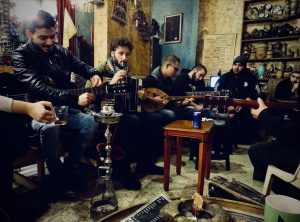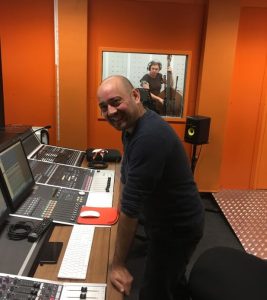Songs from the refugee route to Europe
A new album captures the songs and music of migrants travelling the Balkans route seeking safety in Europe after fleeing war and persecution in the Middle East.
‘The Balkan Route’, produced by No Borders Music has collected, eight haunting pieces of music that explore the experiences and emotions associated with seeking asylum.
No Borders Music is a global collaborative platform for musicians living in exile to create and share music and the album is the first of many intended projects aimed at giving a platform to refugee and asylum seeker musicians.
It stems from events in the Middle East and Europe over the past decade. In 2015 Europe’s borders opened under pressure from more than a million people fleeing conflict in Syria, Iraq and Afghanistan.
 But after the EU and Turkey struck a deal to close the borders stranding thousands along the Balkans route.
But after the EU and Turkey struck a deal to close the borders stranding thousands along the Balkans route.
Australian musician and No Borders Music co-founder Elijah Gentle, who volunteered to support migrants along the Balkans route in 2017, says the times migrants came together in makeshift camps to share music was the inspiration for the record.
“These moments are the inspiration for ‘No Border Music’. After a stint working back in Australia, I earned money to return to the Balkans with some microphones, recording gear and the aim to get back into volunteering and meet some more musicians,” Elijah said.
“I had no clear method for how it would work but, with a bit of chance, this time we would record out jams,’ he said.
After serving lunch to migrants in a refugee camp in Serbia, Elijah would join them in activities.
“I began bringing my accordion and guitar, seeking out someone to jam with. I discovered some very talented musicians. Some were even famous in their home countries,” he said.
“It was these moments, where the music and dancing grew from the incredible passion and intense emotions of those involved… plunged into nostalgia, human connection, good vibrations – whatever it is that music does to allow someone to forget, if just for a moment, the traumatic circumstances that brought them to that utterly depressing camp – music is a truly powerful force.”
Elijah ultimately travelled the route himself meeting many more musicians.
Melbourne-based musician Oscar Poncell was a collaborator on the project. He plays various instruments on several tracks and was involved in the production and engineering.
“Elijah really pulled the project together and brought everything back to Melbourne. I helped with the production here,” Oscar said.
“People were sending bits and pieces back to us via things like drop box, so gradually we put it all together,” he said.

Oscar Poncell
The album was launched at the end of 2019 just before Melbourne went into a series of COVID-19 lockdowns.
“It was a really great project to be part of and it was incredible to hear the stories of the musicians,” Oscar said.
He said the work had a particularly personal dimension for him as her parents arrived in Australia as teenagers in the 1970s fleeing the brutal Pinochet regime in Chile.
“My parents came to Australia after the military dictatorship took control in Chile. They were not refugees technically but they were fleeing a sort of oppression and looking for somewhere safe to live,” Oscar said.
“That’s probably why the project struck a chord with me and I was proud to be on board with it,” he said.
The album is a deeply moving collection of human stories recorded in the Arabic, Kurdish, Farsi, Urdu, Punjabi, Kurmanju and Greek languages.
The Balkan Route is available in vinyl or as a download.












